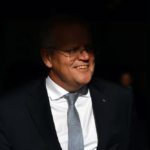Australia needs a vision for early learning
The Productivity Commission has released the final report from its Inquiry into Child Care and Early Childhood Learning. Samantha Page, CEO of Early Childhood Australia, says the report is a good start but lacks a clear enough vision for families.
The Final Report of the Productivity Commission’s Inquiry into Child Care and Early Childhood Learning provides a comprehensive review of the current system, including the failings of the financing or subsidy system that is in clear need of reform.
The report shows that the Government will need to make significant modifications in order to deliver a package of reforms that makes child care more flexible, affordable and accessible.
However, the report doesn’t establish a clear enough vision for children and families that would serve as a rationale for reforms and future investment. Australia is under-invested in early childhood education, and as a result there are children starting school who have missed out on quality early learning, and we have relatively low rates of workforce participation amongst women with young children.
In response to this report we will be seeking to work with Government to identify system improvements that will deliver tangible outcomes for children and families. This includes the development of a new early childhood funding system that improves access to quality early childhood education and care for all children.
If we genuinely want to increase access and affordability and improve our nation’s prosperity, further investment will be required beyond current funding levels.
The Productivity Commission’s proposed benchmark price caps the amount of subsidy families can receive at $7.20 per hour or $72 per day (for children aged three to five). While the average family might be better off under the proposed model, I am particularly concerned about the impact on families living in major Australian cities where prices were higher.
Parents living in higher cost areas, where the price of early childhood education and care is higher than the benchmark, would not be subsidised for higher prices under the proposed subsidy. This means that many families on low, middle and high incomes will be worse off than the current system, potentially making it harder for children and families to maintain access early childhood education and care.
Another issue is the proposed activity test which would reduce subsidised access to early childhood education and care, for children families whose parents were not working, from 24 hours per week down to 10 hours per week. Children from low income families have the most to benefit from access to quality early childhood education and care.
Access to only 10 hours of early childhood education and care per week is not enough for children to be able to form an attachment with their educator and engage in a meaningful early learning experience. At least 15 hours of early childhood education and care per week is the evidence-based standard that we know (from the EPPE Study in the UK) supports good development outcomes for children.
Samantha Page is the Chief Executive Officer of Early Childhood Australia (ECA). Early Childhood Australia is the peak advocacy body for children under eight, their families and early childhood professionals. Sam has worked in a variety of positions within in the community, public and private sectors, spanning service delivery and service management, policy development, change management and public administration. She has worked closely with community sector leaders, Members of Parliament, senior bureaucrats in Federal Government agencies as well as peak bodies, research institutes and universities. Sam’s current appointments include the Board of the Australian Institute of Health and Welfare.












